Write the following Java class without using any external li
Solution
HashTable.java
import java.util.ArrayList;
import java.util.LinkedList;
public class HashTable {
/**
* The hashfunction used
*/
public HashFunction hf;
/**
* size p
*/
private int p = 0;
/**
* The arrayList
*/
private ArrayList<Tuple>[] arr;
/**
* How many elements we have
*/
private int numElements;
/**
* HashTable(int size) Finds the smallest prime integer p whose value is at least size. Creates
* a hash table of size p where each cell initially is NULL. It will determine the hash function to be
* used in the hash table by creating the object new HashFunction(p).
*
* @param size The value to look for
*/
public HashTable(int size){
while (true){
if(isPrime(size)) {
break;
}else{
size++;
}
}
numElements = 0;
//Sets p to prime
p = size;
//new hashFunction
hf = new HashFunction(p);
//Creates our array of linked lists
arr = new ArrayList[p];
//initializes it
for(int i = 0; i < p; i++){
arr[i] = new ArrayList<>();
}
}
/**
* Find max load of hash table
*
* @return maximum load
*/
public int maxLoad(){
int max = 0;
for(int i = 0; i < p; i++){
//look for a bigger list
if(this.arr[i].size() > max)
max = this.arr[i].size();
}
return max;
}
/**
* Find average load of table
*
* @return the average load
*/
public int averageLoad(){
int sum = 0;
int s;
int nonNull = 0;
for(int i = 0; i < p; i++){
s = this.arr[i].size();
//if it contains something then
if(s > 0) {
sum += s; //sum the total up
nonNull++; //and add one to the nonNull Cell list
}
}
return sum/nonNull;
}
/**
* The size of the hash table
*
* @return size of table
*/
public int size(){
return p;
}
/**
* Returns the number of Tuples that are currently stored in the hash table.
*
* @return num number of tuples stored
*/
public int numElements(){
return numElements;
}
/**
* Returns the laod factor which is number of elements / size
*
* @return load factor
*/
public double loadFactor(){
double n = numElements;
double s = this.size();
return n/s;
}
/**
* add(Tuple t) Adds the tuple t to the hash table; places t in the list pointed by the cell h(t.getKey())
* where h is the hash function that is being used. When the load factors becomes bigger than 0.7,
* then it (approximately) doubles the size of the hash table and rehashes all the elements (tuples) to
* the new hash table. The size of the new hash table must be: Smallest prime integer whose value is
* at least twice the current size
*
* @param t Tuple to add
*/
public void add(Tuple t){
numElements++;
int hh = Math.abs(hf.hash(t.getKey()));
this.arr[hh].add(t);
if(loadFactor() > 0.7){
HashTable h = new HashTable(p*2);
}
}
/**
* returns an array list of Tuples (in the hash table) whose key equals k. If no such
* Tuples exist, returns an empty list. Note that the type of this method must be ArrayList<Tuple>
*
* @param k Key to look for
* @return Array List of Tuples
*/
public ArrayList<Tuple> search(int k){
ArrayList<Tuple> list = new ArrayList<>();
ArrayList<Tuple> temp;
//get list from the array
temp = this.arr[Math.abs(hf.hash(k))];
//Get an ArrayList of the elements in my linked list at the key
for(int i = 0; i < temp.size(); i++){
list.add(temp.get(i));
}
return list;
}
/**
* Removes Tuple from table
*
* @param t Tuple to remove
*/
public void remove(Tuple t){
ArrayList<Tuple> temp;
int hashy = hf.hash(t.getKey());//gets rid of one calculation...
//get list from the array
temp = this.arr[hashy];
//now look for the value and remove
for(int i = 0; i < temp.size(); i++){
if(temp.get(i).getValue() == (t.getValue())){
temp.remove(i);
}
}
numElements--;
//put the list back in
this.arr[hashy] = temp;
}
/**
* Helper to see if its a prime
*
* @param x the num to check
* @return true if its a prime
*/
private boolean isPrime(int x){
if (x % 2 ==0) return false;
for(int i = 3; i*i <= x; i+=2) {
if(x % i == 0)
return false;
}
return true;
}
}
HashFunction.java
import java.util.Random;
public class HashFunction {
private int a, b, p;
/**
* HashFunction(int range). Picks the first (positive) prime integer whose value is at least range,
* and sets the value of p to that prime integer. Then picks two random integers x and y from
* {0, 1, · · · , p 1} and sets a as x and b as y.
*
* @param range the prime value we want to be at least, and our random val range
*/
public HashFunction(int range){
int val = range;
//Checks if range is a prime, if not then keep incrementing until you find a prime
while (true){
if(isPrime(val)) {
break;
}else{
val++;
}
}
//set p to our prime
this.p = val;
//Finds a random number
Random random = new Random();
int x = random.nextInt(range);
int y = random.nextInt(range);
//and sets it to a and b
this.a = x;
this.b = y;
}
/**
* Returns the value of the hash function on x
*
* @param x value of hash on this
* @return (ax + b)%p
*/
public int hash(int x){
return (this.a * x + this.b) % this.p;
}
/**
*
* @return a
*/
public int getA(){
return a;
}
/**
*
* @return b
*/
public int getB(){
return b;
}
/**
*
* @return p
*/
public int getP(){
return p;
}
/**
*
* @param x set A to x % p
*/
public void setA(int x){
this.a = x % this.p;
}
/**
*
* @param y set B to y % p
*/
public void setB(int y){
this.b = y % this.p;
}
/**
* This method will pick the first (positive)
* prime whose value is at least x and sets the value of p to that integer.
*
* @param x The prime we want to be at least this number
*/
public void setP(int x){
//Checks if range is a prime, if not then keep incrementing until you find a prime
while (true){
if(isPrime(x)) {
break;
}else{
x++;
}
}
//Sets p to prime
this.p=x;
}
/**
* Helper to see if its a prime
*
* @param x the num to check
* @return true if its a prime
*/
private boolean isPrime(int x){
if (x % 2 ==0) return false;
for(int i = 3; i*i <= x; i+=2) {
if(x % i == 0)
return false;
}
return true;
}
}
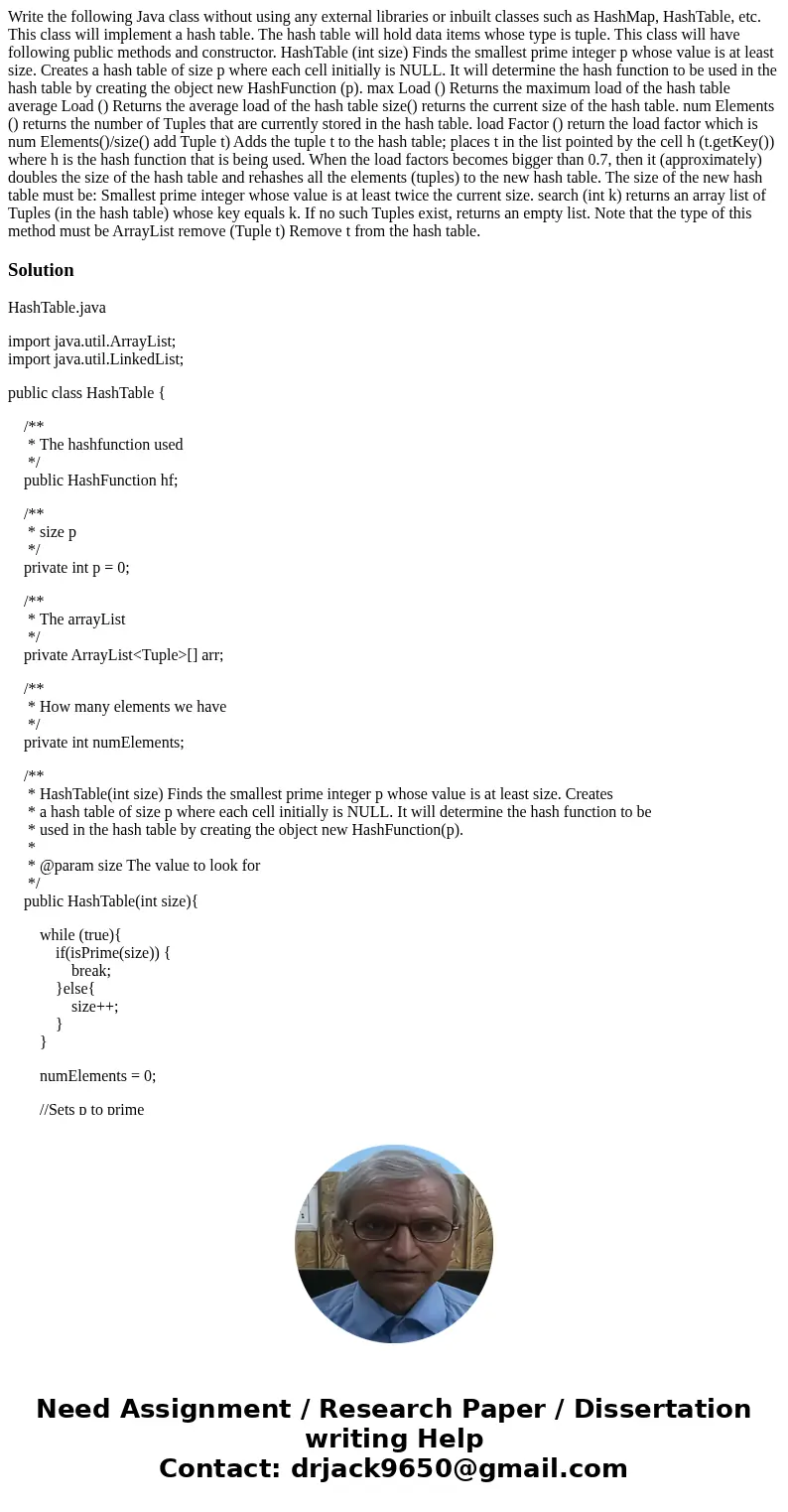
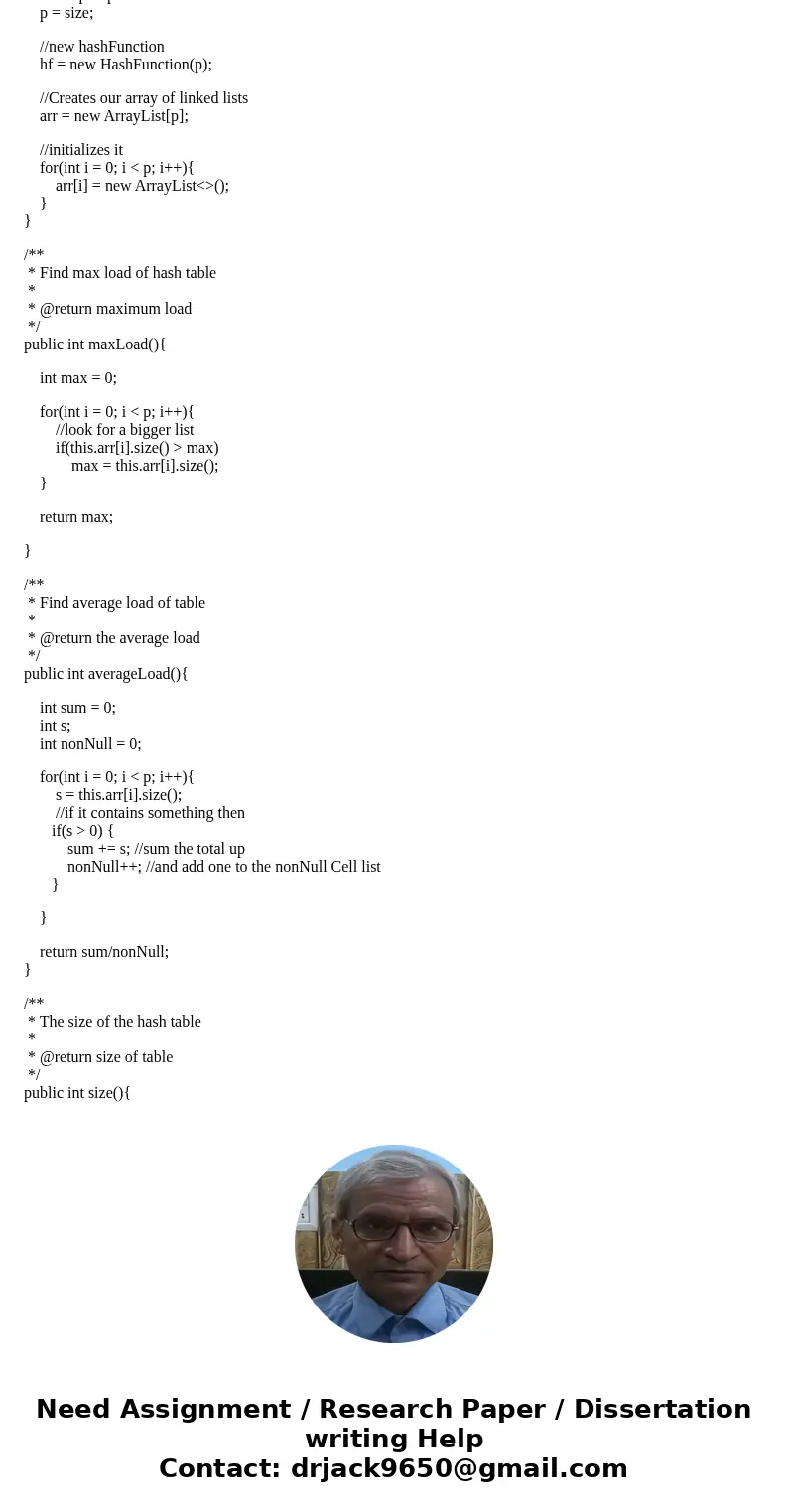
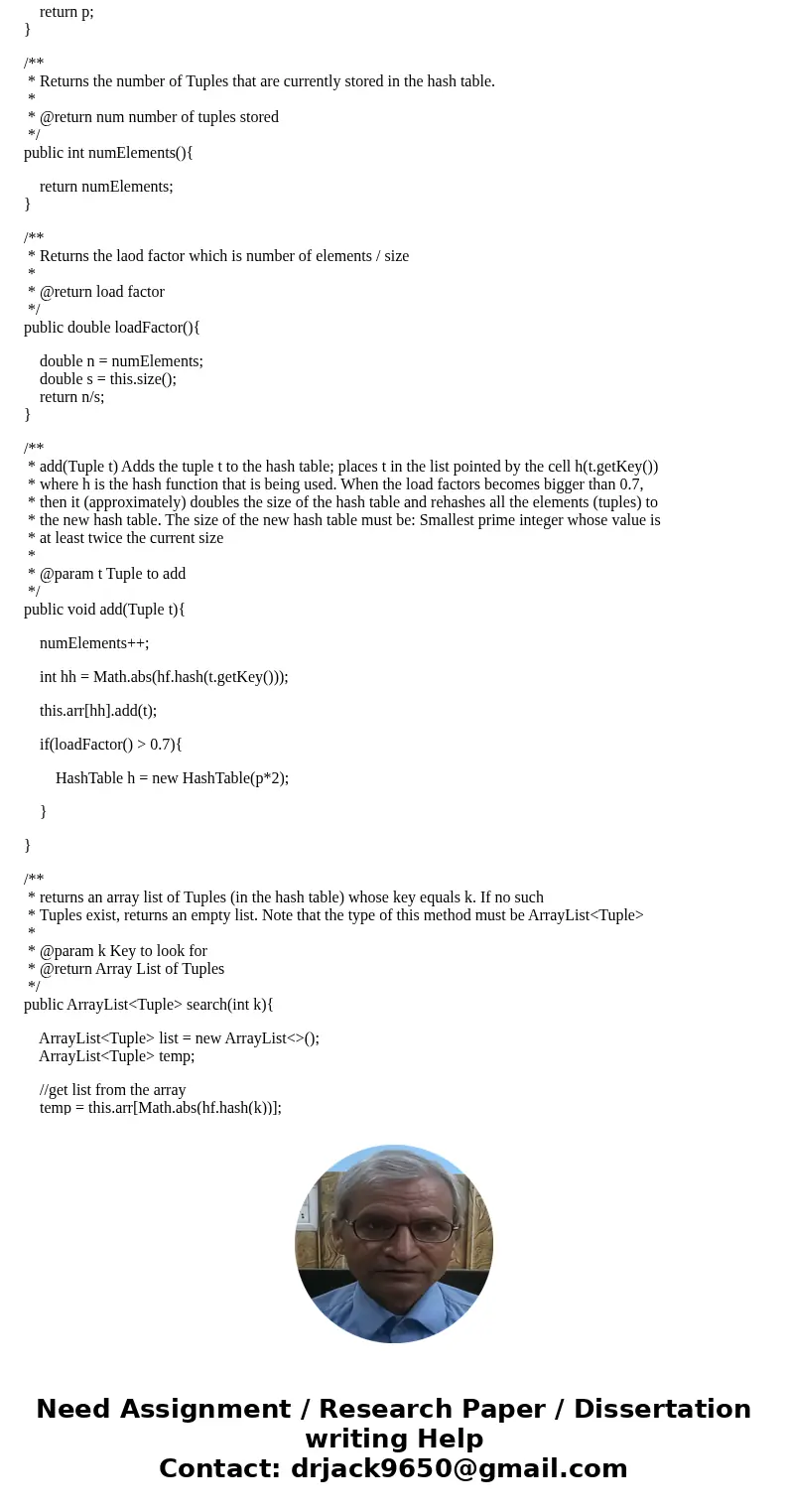
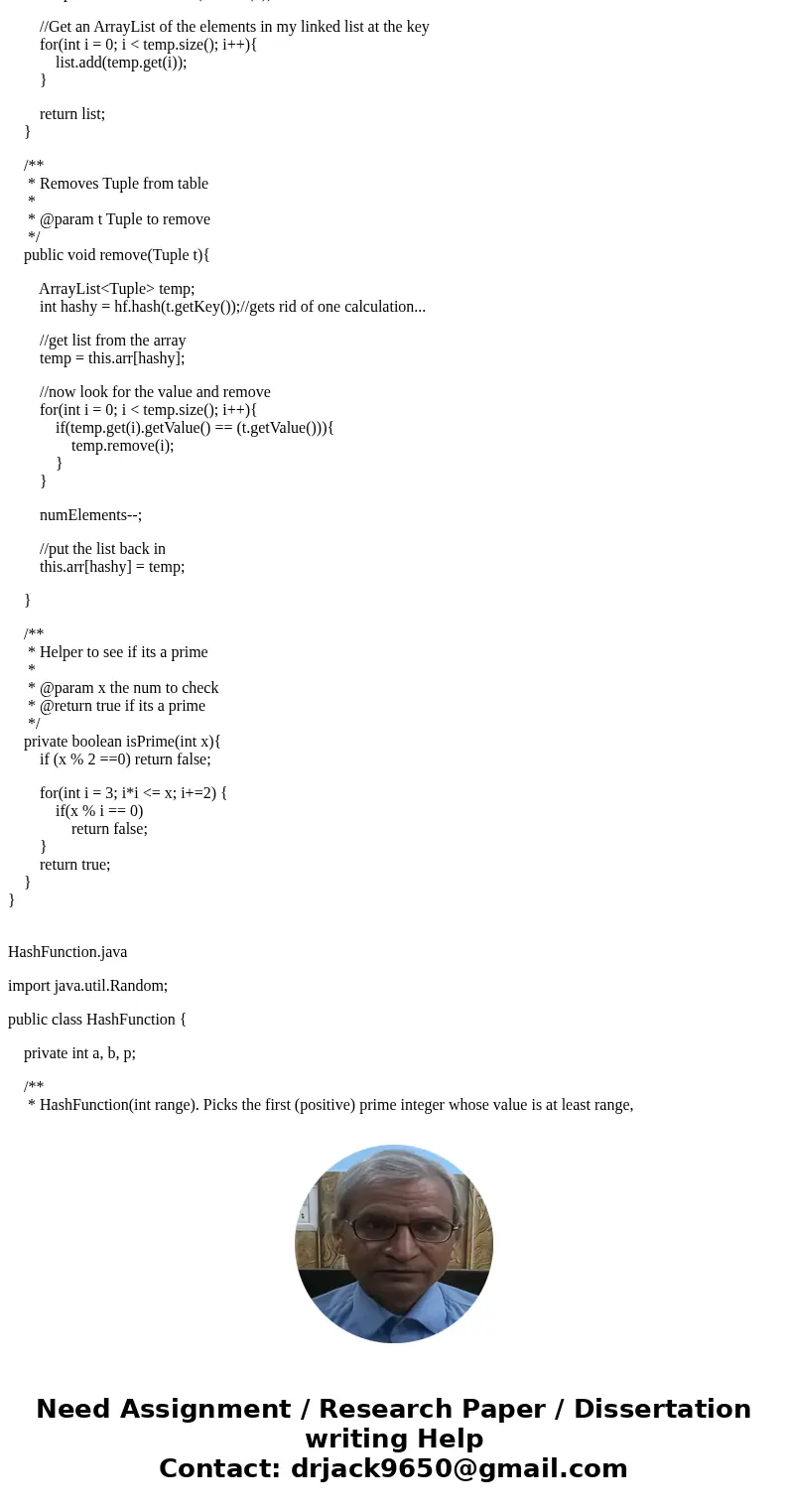
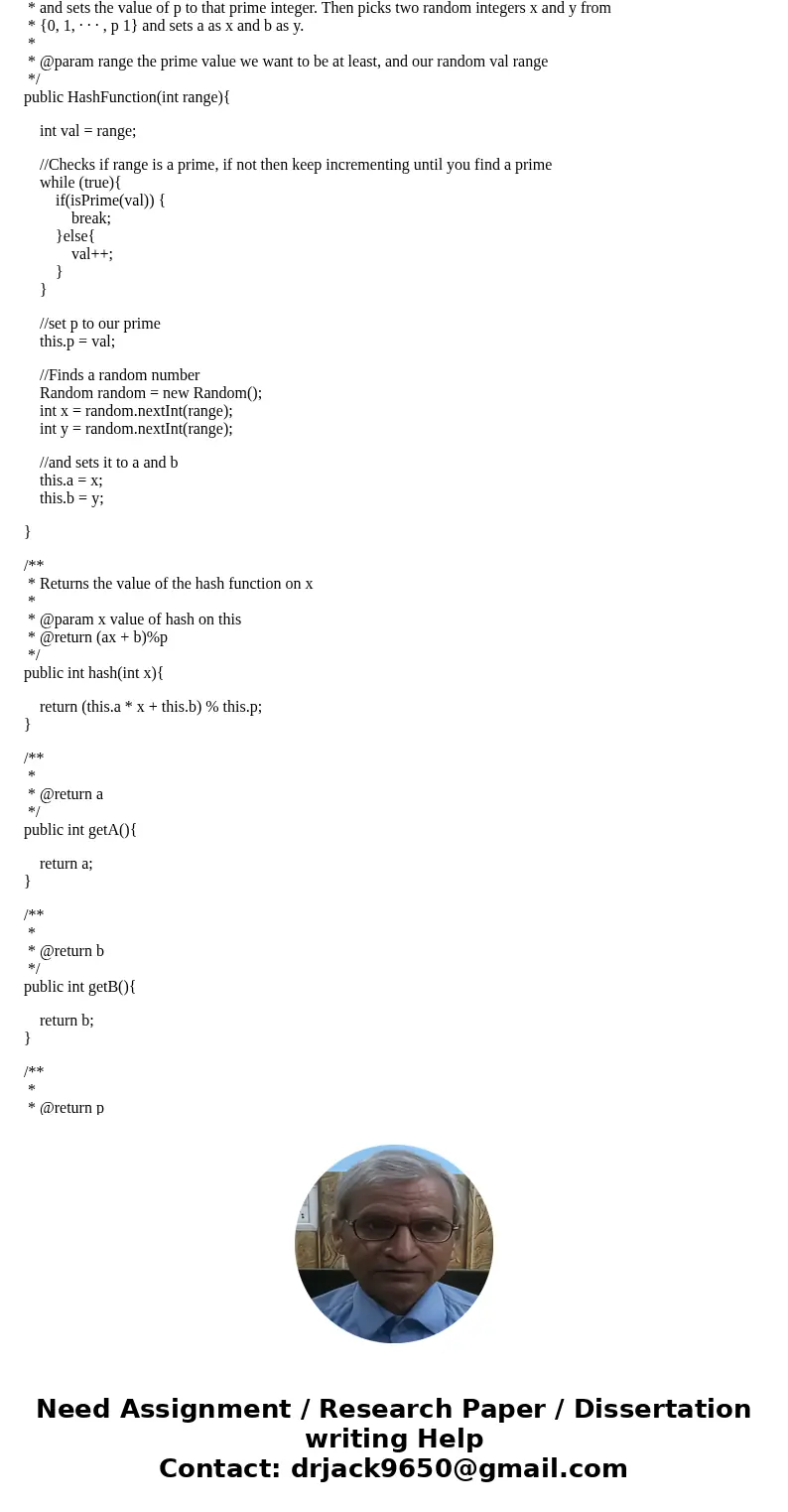
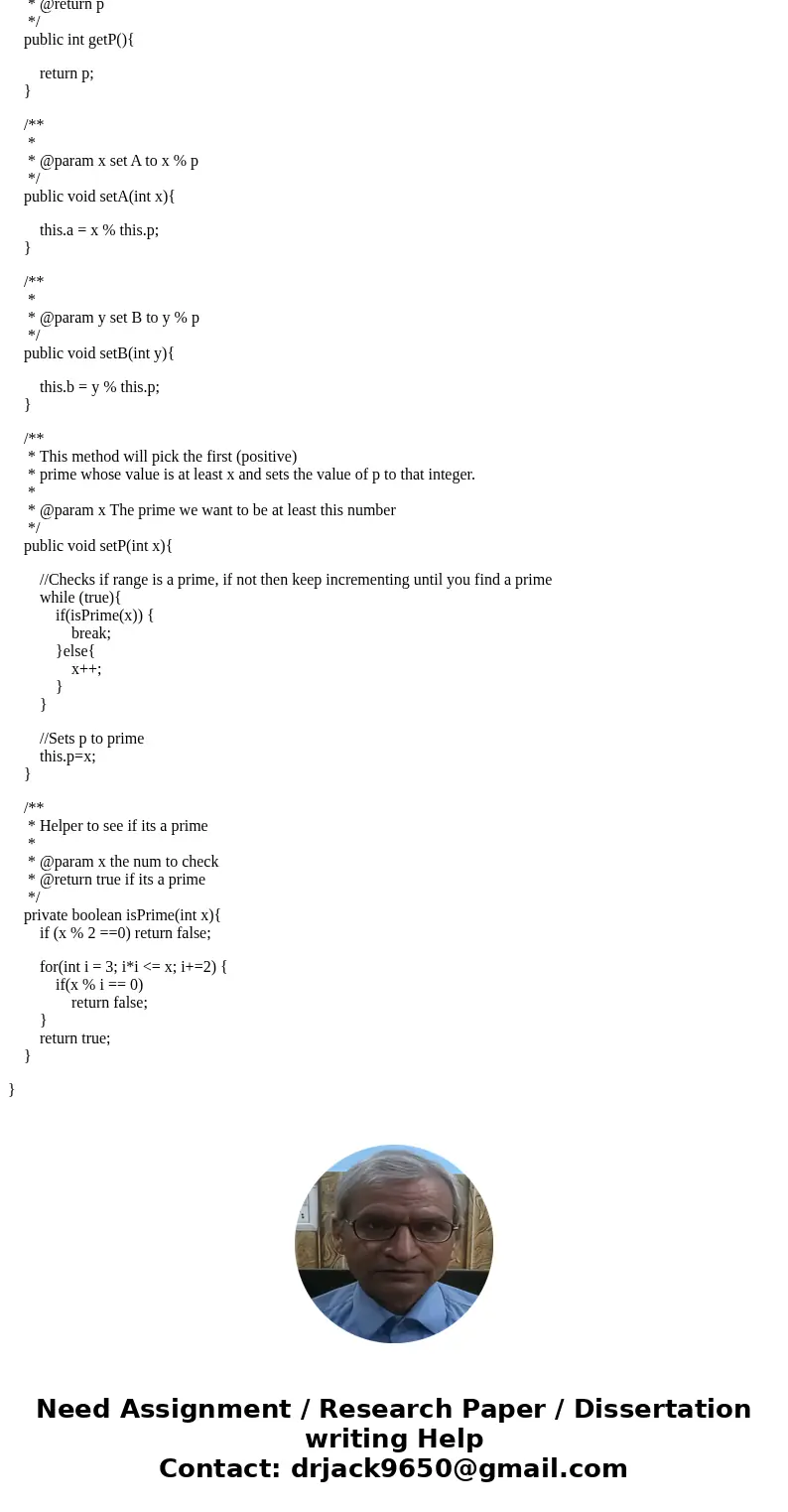
 Homework Sourse
Homework Sourse